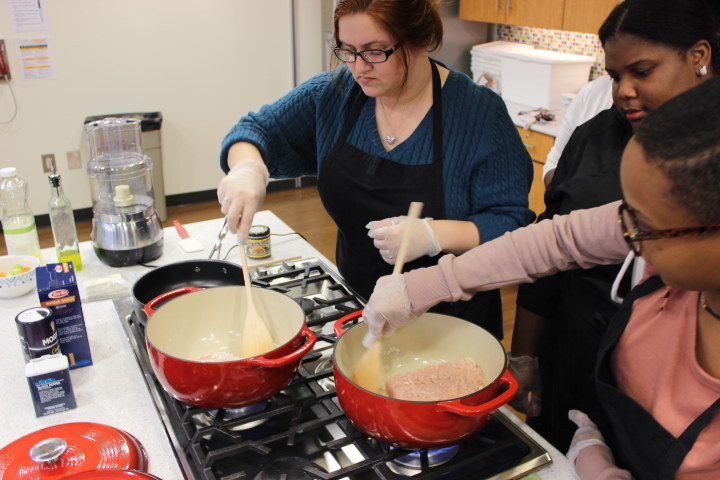The Center for Health Promotion and Wellness is hosting cooking demos and encouraging students to develop healthier eating habits.
The demonstrations teach students how to cook nutritious meals that are easy to make with limited resources.
Organized by campus dietitians Bethany Wheeler and Barbara Oldham, the Center for Health Promotion and Wellness has hosted these demos since fall 2015. The kitchen facility in the Kennesaw campus rec center was a perfect place to begin offering these classes, which have been the center’s most successful student programs.
“Our demos are designed to be very practical recipes for students. We focus on food safety and we also incorporate food science,” Wheeler said. “We want it to be something that students are going to be very likely to do back at home or in their dorms.”
Each demo has only 12 spots open for students. Though the instructors oversee the process, they want the participants themselves to do all of the cooking to gain confidence in the kitchen.
The Center for Health Promotion and Wellness also hosts “Love Your Body Week” as an extension of National Eating Disorder Awareness Week. Though in the past these events have been more centered on eating disorders, the center has shifted the focus to be applicable to more students.
“We expanded [‘Love Your Body Week’] to really encompass self-care and celebrate body diversity as well as promoting positive body image and being a resource for anyone who struggles with eating disorders,” Wheeler explained.
As part of “Love Your Body Week,” the center hosted a dessert cooking demo that taught students to prepare key lime pie with a whipped cream topping from scratch.
Wheeler recommends keeping ingredient lists small when following recipes, which is usually cheaper and less time-consuming. Finding out what foods are in season and buying things on sale can also help shoppers save money. Cooking in bulk can be beneficial for students, if they have somewhere to store the extra food.
Wheeler said the most common mistakes she sees students make in the kitchen include handling raw meat improperly, not using knives safely, and being inflexible when it comes to recipes.
“Sometimes people get anxious if they veer off the recipe, but you can. You have that flexibility,” Wheeler said. “I also like to teach them how you don’t have to use measuring cups and spoons when cooking.”
“It’s cool when students think they make a mistake, and then it turns out well. They’re more likely to do that recipe when they’re on their own,” she said.
Four more cooking demos will be hosted throughout the spring semester, with multiple time slots open for each demo. The upcoming demo “Soy You Think You Can Sushi?” will be held March 7-9. Students can register for this demo and find more information on future events on the Center for Health Promotion and Wellness’ page on OwlLife.



